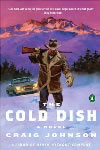The other day, I was doing a talk for a class of graduate students down the road. They're studying artistic practice in the world of computers. One young woman asked me if I thought artists needed to master the technology.
I think artists need to master everything. It all counts. You need vision and you need execution; you need immediacy and spontaneity and control and polish. Neatness counts. Everything counts.
It doesn't matter that these imperatives contradict each other. That's art. If you don't like it, there are other things to do.
The purpose of art is to delight us; certain men and women (no smarter than you or I) whose art can delight us have been given dispensation from going out and fetching water and carrying wood. It's no more elaborate than that. — David Mamet
The hope that we can be excused from mastering programming is the child’s plea to the teacher, "Will this be on the exam?" It's the hope that we may be permitted to fail, and that our failure will be overlooked because we're so cute and wonderful. We don't need to master programming (or hardware, or graphic design, or information architecture): we're just artists and either someone will buy us an expert to do the work or they'll simply ignore any shortcomings because we are so intrinsically wonderful.
The film world is not a model. People sometimes point to movies as an ideal, a world where specialists in different crafts work together, where you've got the sound guy and the lights guy and the camera guy and the acting guy and the directing guy and the money guy and the effects guy and everyone works together. But that's an artifact of the capital demands of film's tie to real estate.
Until very recently, films needed to pay rent for lots of elaborate buildings in every city and village in the world, filled with comfortable chairs and exotic equipment. If you're renting that much real estate, fixed costs like adding another assistant producer don't matter. Direct-to-video is going to change that forever, but it's only just beginning.
If film people could work without all those specialists, most of them would.







